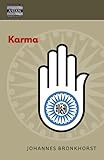Karma / Johannes Bronkhorst.
Material type: TextSeries: Dimensions of Asian Spirituality ; 18Publisher: Honolulu : University of Hawaii Press, [2011]Copyright date: ©2011Description: 1 online resource (176 p.)Content type:
TextSeries: Dimensions of Asian Spirituality ; 18Publisher: Honolulu : University of Hawaii Press, [2011]Copyright date: ©2011Description: 1 online resource (176 p.)Content type: - 9780824835705
- 9780824860158
- 202 .20954 22
- online - DeGruyter
- Issued also in print.
| Item type | Current library | Call number | URL | Status | Notes | Barcode | |
|---|---|---|---|---|---|---|---|
 eBook
eBook
|
Biblioteca "Angelicum" Pont. Univ. S.Tommaso d'Aquino Nuvola online | online - DeGruyter (Browse shelf(Opens below)) | Online access | Not for loan (Accesso limitato) | Accesso per gli utenti autorizzati / Access for authorized users | (dgr)9780824860158 |
Browsing Biblioteca "Angelicum" Pont. Univ. S.Tommaso d'Aquino shelves, Shelving location: Nuvola online Close shelf browser (Hides shelf browser)

|

|

|

|

|

|

|
||
| online - DeGruyter Ainu Spirits Singing : The Living World of Chiri Yukie's Ainu Shin'yoshu / | online - DeGruyter Bringing Zen Home : The Healing Heart of Japanese Women's Rituals / | online - DeGruyter Changing Contexts, Shifting Meanings : Transformations of Cultural Traditions in Oceania / | online - DeGruyter Karma / | online - DeGruyter The Buddhist Dead : Practices, Discourses, Representations / | online - DeGruyter Confluences of Medicine in Medieval Japan : Buddhist Healing, Chinese Knowledge, Islamic Formulas, and Wounds of War / | online - DeGruyter My Viet : Vietnamese American Literature in English, 1962-Present / |
Frontmatter -- Contents -- Special Topics -- Editor's Preface -- Preface -- Introduction -- Part I. Orthodox Karma -- 1. Origins and Religious Use -- 2. Karma in and after Greater Magadha -- 3. Karma in Brahmanism -- 4. Karma and Philosophy -- Part II. Variants of Karma -- 5. Transfer of Merit -- 6. Competitors of Karma -- 7. From One Life to the Next -- 8. Devotion -- Concluding Comments -- Further Reading -- Index
restricted access online access with authorization star
http://purl.org/coar/access_right/c_16ec
Karma has become a household word in the modern world, where it is associated with the belief in rebirth determined by one's deeds in earlier lives. This belief was and is widespread in the Indian subcontinent as is the word "karma" itself. In lucid and accessible prose, this book presents karma in its historical, cultural, and religious context.Initially, karma manifested itself in a number of religious movements-most notably Jainism and Buddhism-and was subsequently absorbed into Brahmanism in spite of opposition until the end of the first millennium C.E. Philosophers of all three traditions were confronted with the challenge of explaining by what process rebirth and karmic retribution take place. Some took the drastic step of accepting the participation of a supreme god who acted as a cosmic accountant, others of opting for radical idealism. The doctrine of karma was confronted with alternative explanations of human destiny, among them the belief in the transfer of merit. It also had to accommodate itself to devotional movements that exerted a major influence on Indian religions.The book concludes with some general reflections on the significance of rebirth and karmic retribution, drawing attention to similarities between early Christian and Indian ascetical practices and philosophical notions that in India draw their inspiration from the doctrine of karma.
Issued also in print.
Mode of access: Internet via World Wide Web.
In English.
Description based on online resource; title from PDF title page (publisher's Web site, viewed 02. Mrz 2022)


